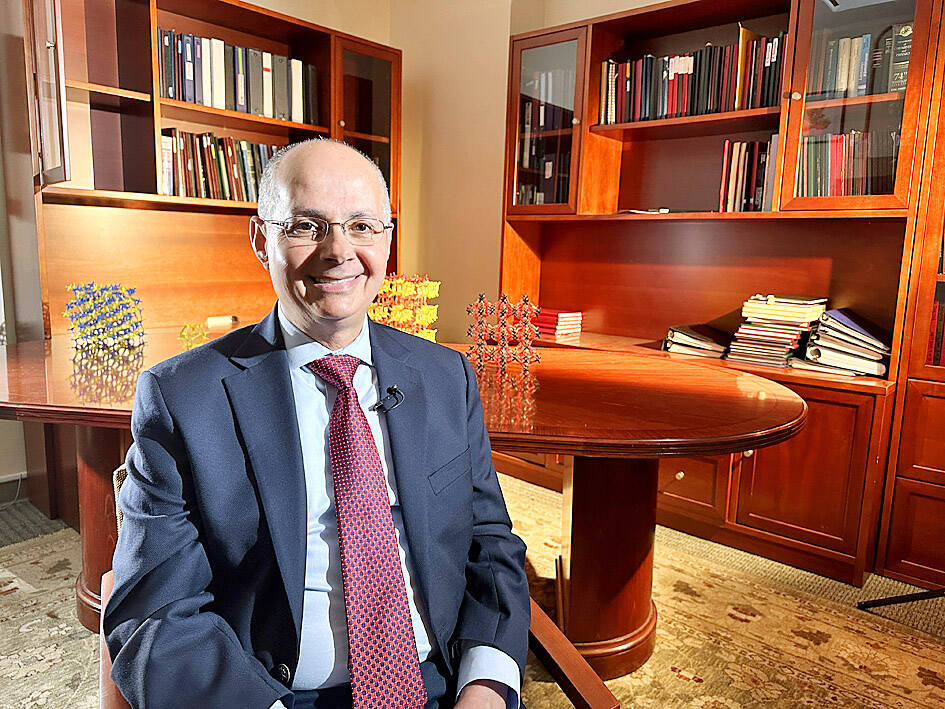Omar Yanghi yesterday was named this year’s winner of the Tang Prize in Sustainable Development.
Yanghi, a professor of chemistry at the University of California, Berkeley, was awarded for developing frameworks that can be tailored to harvest water from desert air, capture carbon, or store hydrogen and methane, the Tang Prize Foundation said.
Born in Amman to a refugee family from Palestine, Yanghi grew up in Jordan’s desert environment, the foundation said.

Photo: CNA
He understands the power that science and research have to transform lives in regions where opportunities are scarce, it said.
Yanghi’s contributions to sustainable development are pioneering the development of reticular chemistry, a new field that is focused on making materials by stitching organic and inorganic units into robust, porous, crystalline metal-organic frameworks (MOFs) and covalent organic frameworks (COFs), the foundation said.
“He demonstrated how hydrogen, methane, carbon dioxide and water from air can be trapped, concentrated and manipulated by these two extensive classes of novel framework materials,” it said. “Those materials in turn have created new avenues and are at the forefront of solving the world’s most pressing challenges of energy, environment and, in particular water sustainability.”
The materials created through Yanghi’s frameworks make storage of large quantities of hydrogen and methane safer, it said, adding that they open doors for methods to harvest potable water.
MOFs and COFs have the potential to improve hydrogen storage efficiency, and MOFs in fuel tanks can potentially triple the amount of methane stored at room temperature and safe pressures, making it possible for vehicles to triple their range, the foundation said.
Yanghi’s studies found that carbon dioxide storage capacity can be increased 18-fold at room temperature simply by adding MOFs, while MOFs and COFs are capable of selectively capturing carbon dioxide from combustion gases, it said.
Yanghi also discovered that MOFs seek and trap water from low-humidity air and concentrate it within their pores, it said.
Using the reticular approach, he designed a water harvester to deliver fresh drinking water in arid regions using only sunlight as energy, it said.
His research group designed MOF water harvesters and installed them in some of the world’s driest areas, and the water from them has been shown to have exceeded standards for drinking water set by the US Food and Drug Administration and the US Environmental Protection Agency, the foundation said.
Yanghi’s contributions are unique, as he has succeeded in taking a groundbreaking branch of science to “unprecedented levels of practical applications for sustainability,” it said, adding that the technology is now being pursued by laboratories, start-ups, and major chemical firms and automakers.
The value of the technology was estimated at US$351 million in 2022, up from US$271 million in 2021, it said.
He holds 60 patents for the technology, has won awards in 17 countries and presided over a mentoring program for the technology, which is implemented in research centers he built in Argentina, Jordan, Malaysia, Mexico, Saudi Arabia and Vietnam, the foundation said.

The Ministry of Economic Affairs has fined Taobao NT$1.2 million (US$36,912) for advertisements that exceed its approved business scope, requiring the Chinese e-commerce platform to make corrections in the first half of this year or its license may be revoked. Lawmakers have called for stricter enforcement of Chinese e-commerce platforms and measures to prevent China from laundering its goods through Taiwan in response to US President Donald Trump’s heavy tariffs on China. The Legislative Yuan’s Finance Committee met today to discuss policies to prevent China from dumping goods in Taiwan, inviting government agencies to report. Democratic Progressive Party Legislator Kuo Kuo-wen (郭國文) said

The Ministry of Economic Affairs has fined Taobao NT$1.2 million (US$36,900) for advertisements that exceeded its approved business scope and ordered the Chinese e-commerce platform to make corrections in the first half of this year or its license would be revoked. Lawmakers have called for stricter supervision of Chinese e-commerce platforms and more stringent measures to prevent China from laundering its goods through Taiwan as US President Donald Trump’s administration cracks down on origin laundering. The legislature’s Finance Committee yesterday met to discuss policies to prevent China from dumping goods in Taiwan, inviting government agencies to report on the matter. Democratic Progressive Party

Taiwan and its Pacific ally Tuvalu on Tuesday signed two accords aimed at facilitating bilateral cooperation on labor affairs, according to Taiwan’s Ministry of Foreign Affairs (MOFA). The governments inked two agreements in Taipei, witnessed by Foreign Minister Lin Chia-lung (林佳龍) and visiting Deputy Tuvaluan Prime Minister Panapasi Nelesone, MOFA said in a news release. According to MOFA, the agreements will facilitate cooperation on labor issues and allow the two sides to mutually recognize seafarers’ certificates and related training. Taiwan would also continue to collaborate with Tuvalu across various fields to promote economic prosperity as well as the well-being of their

Sung Chien-liang (宋建樑), who led efforts to recall Democratic Progressive Party (DPP) Legislator Lee Kun-cheng (李坤城), was released on bail of NT$80,000 today amid outcry over his decision to wear a Nazi armband to questioning the night before. Sung arrived at the New Taipei District Prosecutors’ Office for questioning in a recall petition forgery case last night wearing a red armband bearing a swastika, carrying a copy of Adolf Hitler’s Mein Kampf and giving a Nazi salute. Sung left the building at 1:15am without the armband and covering the book with his coat. Lee said today that this is a serious